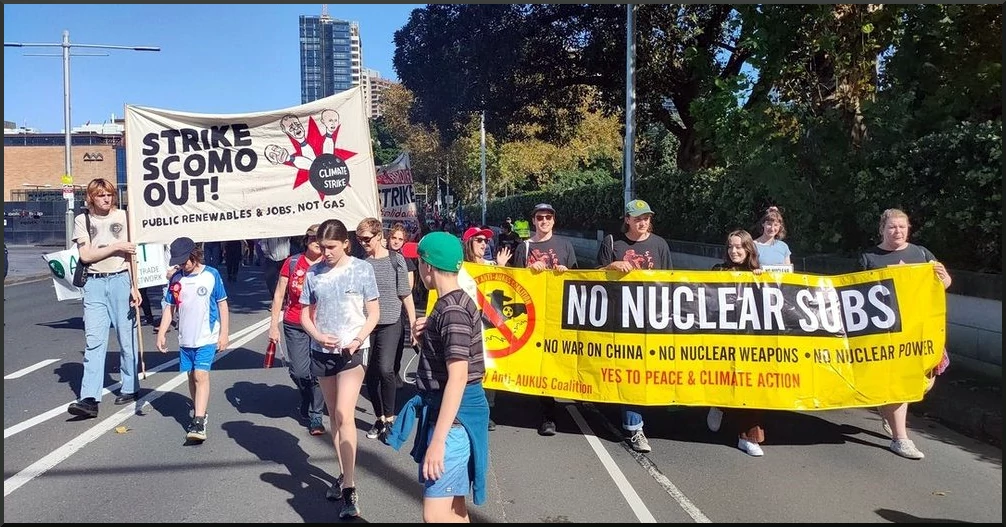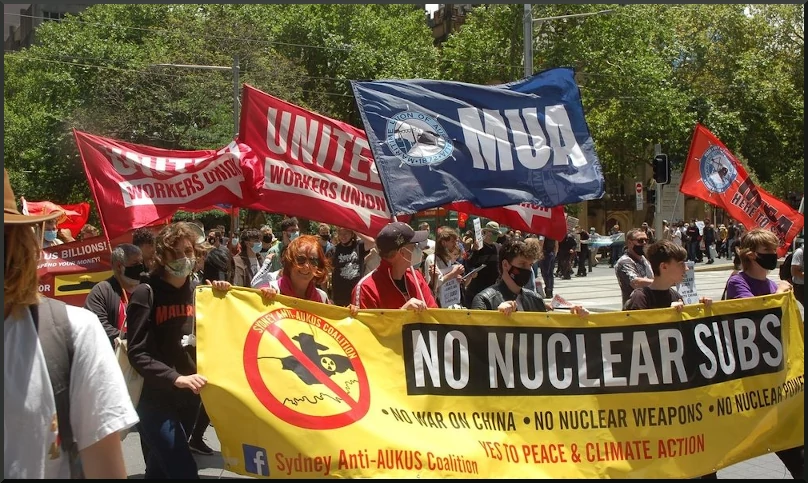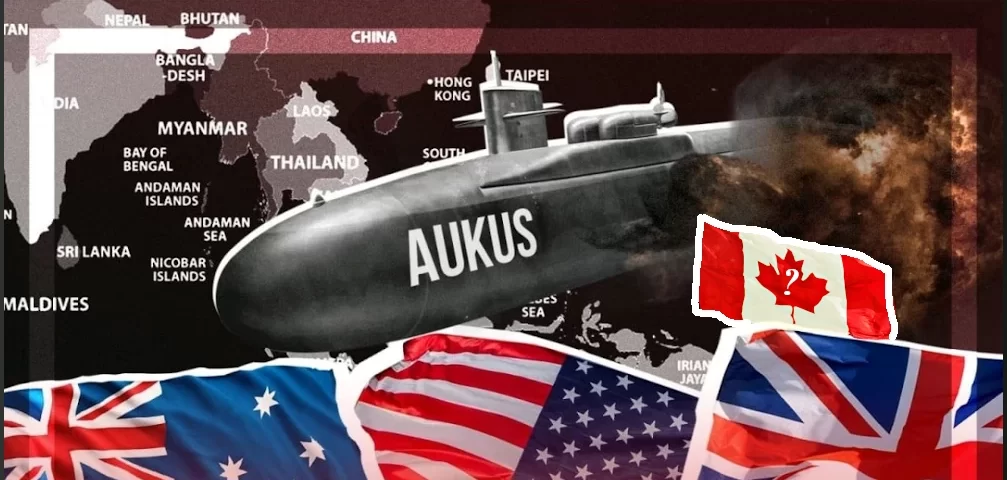by Ken Stone, published on The Canada Files, May 20, 2022
This is an excellent overview of AUKUS and the regional responses to it. Most of our readers are in the U.S. so unfortunately our government is responsible for this aggression against China, but it is interesting to see the numerous forces within Canadian society who object to efforts by their government to join in. [jb]
The AUKUS military pact, among the USA, UK, and Australia, was announced to the world last year on September 15, 2021. It doesn’t mention China by name but Ben Wallace, UK Defence Secretary, described AUKUS as a response to China “embarking on one of the biggest military spends in history… growing its navy [and] air force at a huge rate.”
While Western political elites cheered vapidly for it, support for this deal has been non-existent at the grassroots level. In Australia, labour unions have lead the fightback against this deal, while the Green Party condemns the deal. In Canada, politicians in all parliamentary parties cheered on this deal, with the opposition to the deal is being led by Canadian labour activists. China has opposed the deal firmly, while New Zealand refused to join AUKUS. Japan is one of the only countries in the region which is considering joining the deal.
What is AUKUS?
The AUKUS military agreement represents the most serious escalation of military force against the People’s Republic of China by the “Anglosphere” since former US President Obama declared his “Pivot to Asia” in 2009. The “Pivot to Asia” was a de facto declaration of US intent to focus its military, political, economic, and other soft power resources to contain and weaken China, which it recognized as a rival and a threat to US world hegemony – even though China repeatedly denied seeing itself as a rival to the US and eschewed the role of world hegemon.

The main aspect of this pact was the sharing of Anglo-American nuclear technology with Australia, which purchased at least eight nuclear submarines from the USA at a cost of over $100 billion USD. However, the first of these submarines is not expected to be operational for more than a decade. None of these countries held a referendum of its citizens on forming this new alliance.
By engaging in this purchase, Australia reneged on a previous deal to buy diesel submarines from France, for which betrayal Australia stands to pay hundreds of millions of dollars in penalties. In turn, France, which is a NATO ally of the three countries, recalled its ambassadors from Australia and the US. French President Macron termed the pact a “stab in the back“ following Australia’s cancellation of a French–Australian submarine deal worth €56 billion (A$90 billion), without notice.
Why were the USA and UK willing to throw France under the bus? By sharing their proprietorial nuclear weapons technology with Australia, the USA and UK stood to make a lot of money for their domestic arms manufacturers.
They wanted Australia to shoulder a much greater burden of engaging China closer to the Chinese mainland than French diesel, or even French nuclear, subs could possibly accomplish. The French diesel submarines, which had been purchased by a previous Labor government, did not have the range to carry on offensive missions at such a distance from Australia. Even French nuclear subs, with their lower fission grade than the US/UK models, would have to refuel between Australia and China.
The deal marked a complete volte face for Australia because, until the AUKUS deal was inked, Australia had maintained a deliberately non-nuclear policy. (See Text box #2) In addition, buying nuclear subs was clearly a violation on the part of the AUKUS pact members of the UN Nuclear Non-Proliferation Treaty (NPT) by introducing nuclear weaponry into the previously nuclear-weapons free Asia-Pacific region, covered by the South Pacific Nuclear Free Zone Treaty (Treaty of Rarotonga, 11 December 1986). [See text box #1] Since AUKUS is clearly aimed at the People’s Republic of China, the deal to introduce nuclear subs into the region will only escalate tensions between Australia and China, even though China is Australia’s largest trading partner.
It’s interesting to note that only six countries of the world have nuclear-powered subs: the USA, UK, Russia, France, China and India.
Opposition to AUKUS Within Australia
The pact drew a lot of criticism within Australia. Significantly, trade unions took the lead. Trade unions, such as the Maritime Union of Australia, published a statement entitled, “No Nuclear Subs, No AUKUS, No War on China!”

MUA then called its members to “hit the streets” in nine separate demonstrations.
In addition, the union also noted in a statement on Sept 21, 2021, the International Day Of Peace, that “the deal will continue to escalate unnecessary conflict with China.”
The Electrical Trades Union of Australia, which represents over 60,000 Australian electrical workers, also condemned the AUKUS deal as a “dangerous delusion”. It noted:
“Nuclear submarines will require significant offshore maintenance, undermining Australia’s sovereign capability. Surely the recent experience with COVID demonstrated the danger of relying on international supply chains for the core needs of a self-respecting nation.”
ETU National Assistant Secretary Michael Wright said the decision represented a betrayal of workers’ interests on two levels:
“This decision represents a betrayal of responsibility to Australia’s non-nuclear policy and a betrayal of two generations of highly-skilled, secure, well-paying Australian shipbuilding jobs.”
“It is dangerous and delusional to rely on nuclear submarines for our defence. We are fearful this will also cost Australia much needed engineering, manufacturing, and construction jobs.”
There was also significant opposition within the Australian political scene at the highest levels. Two former prime ministers condemned the pact. Paul Keating, 24th prime minister, (Labor) wrote in a statement that “This arrangement would witness a further dramatic loss of Australian sovereignty as materiel dependency on the United States robbed Australia of any freedom or choice in any engagement that Australia may deem appropriate.” Kevin Rudd, 26th prime minister, (Labor) launched a scathing attack on PM Scott Morrison’s betrayal of French-Australian relations in a written statement to the French daily, Le Monde, and in another interview to Australian media, termed AUKUS “a foreign policy and national security debacle.”
The Green Party of Australia took the position that it would “not proceed with the AUKUS nuclear-powered submarine deal” and instead would “pour the money saved from defence spending back into the community.”
There was also massive opposition to the AUKUS deal within Australia’s peace movement, which swiftly created the Sydney Anti-Aukus Coalition (SAAC), which boasts many union endorsements. This anti-AUKUS sentiment manifested itself in a series of anti-AUKUS countrywide demonstrations from December 2021 to May Day 2022.
SAAC speakers informed the Australian public that the terms of the AUKUS pact would increase the number of US troops stationed in Australia (currently at 2500), along with US naval, air, and logistics deployment in the country. Meanwhile, for the cost of eight nuclear submarines, Australia could build 320,000 new homes, 450 schools; and 150 hospitals: creating 130,000 jobs over ten years.
Reaction to AUKUS in Canada
The announcement of AUKUS came during of the last week of the federal election of September 2021, in which Justin Trudeau was returned to power with a minority government.
The ink was hardly dry on the AUKUS agreement when Erin O’Toole announced that his Conservative Party would push to join AUKUS. When asked at a campaign stop in New Brunswick whether he would pick up the phone to ask the other countries to let Canada into the AUKUS club, O’Toole answered, “Yes.”
During his Sinophobic election campaign, O’Toole promised immediately to ban Huawei from Canada’s 5G rollout, withdraw Canada from the the China-led Asian Infrastructure Investment Bank and seek to join the Quad. The Conservatives also pledged to pursue a Canada-Australia-New Zealand-U.K. partnership, which he dubbed “CANZUK,” to deepen the Commonwealth allies’ cooperation in areas such as trade, defense and intelligence.
“This is another example that Mr Trudeau is not taken seriously by our friends and allies around the world,” the Conservative leader, Erin O’Toole, told reporters. “Canada is becoming more irrelevant under Mr Trudeau.”
For his part, NDP leader Jagmeet Singh also criticized the prime minister for Canada not being included in the military agreement and postulated that Trudeau had become too distracted by the election campaign to fully engage with allies. If Canada became an AUKUS member, he said, it could put pressure on China to free the Two Michaels (two Canadians convicted in China for breaches of Chinese security laws and who were returned to Canada in an agreement that saw Meng Wanzhou repatriated to China): “The (AUKUS) pact seems like a potential avenue to add more pressure [on China]. Canada was absent. Another reason why this election should not have been called,” said Singh.
At the time, Trudeau pooh-poohed the notion that Canada had been deliberately excluded from the AUKUS deal and answered the criticisms with the glib response that the arrangement was simply a sale of submarine technology to Australia. “We continue to be strong members of the Five Eyes,” Trudeau said. “This is a deal for nuclear submarines, which Canada is not currently or any time soon in the market for. Australia is.”
The Globe and Mail asked Daniel Minden, a spokesperson for Canadian Defence Minister Anita Anand, on April 5, 2022, if the federal government was concerned by the deepening AUKUS partnership (now including hypersonic missiles and electronic warfare) but declined to answer. He did say that Ottawa has long-standing defence partnerships with all three countries and the Trudeau government would soon present a spending package to help modernize North American aerospace defence:
“Canada and the United States co-ordinate particularly closely regarding emerging threats to the North American continent – including long-range cruise missiles such as hypersonics.”
What do the comments above from Canadian political leaders tell us? They tell us that the Conservative Party of Canada is unabashedly Sinophobic. They tell us that Justin Trudeau and his Liberals are comfortable with AUKUS, which is manifestly the most destabilizing US initiative in the Asia-Pacific region in more than a decade. Trudeau’s complacency with the fact that AUKUS introduces nuclear weapons into a hitherto nuclear-weapons-free zone fits with his failure to have Canada join the 2017 UN Treaty on the Prohibition of Nuclear Weapons (TPNW). Rather than condemning AUKUS as a direct threat to China, Trudeau, the same vassal-like leader who kidnapped Meng Wanzhou in 2018 at the behest of then-US President Donald Trump (when the leaders of eight other countries, including Belgium and Costa Rica, refused to do so), is proud to be a willing accomplice of empire.
As for Jagmeet Singh and the New Democrats, they have long been content to be seen as part of the loyal opposition. Loyal to empire, that is. In fact, the party goes out of its way to demonstrate its fierce public antipathy to countries targeted by the US empire, most recently in the cases of MP Heather McPherson’s unanimously-passed resolution in the House of Commons a few weeks ago to recognize Russia’s special military operation in the Ukraine as a “genocide” and in its support last year for the Conservative/Green Motion 56 which falsely accused China of a genocide of Uygurs in Xinjiang Province.
To say that working class Canadians are not well-served by Canadian parliamentary political parties is an understatement.
New Zealand Rejects AUKUS
New Zealand, a charter member of the neo-colonial white supremacist Five Eyes intelligence network, chose not to join AUKUS. New Zealand Prime Minister Jacinda Ardern, confirmed that nuclear-powered Australian submarines would not be permitted to operate in New Zealand’s internal waters (i.e., within the 12-nautical-mile zone).” She also added, “It does not change our existing relationship including Five Eyes or our close partnership with Australia on defence matters.”
New Zealand had been part of the US-led ANZUS Security Agreement of 1951 among Australia, New Zealand and the United States in 1951. The US suspended its obligations to New Zealand in 1986 in the wake of a forty-year-long, popular, anti-nuclear campaign that resulted in New Zealand declaring itself a nuclear-free zone and refusing entry to nuclear-powered ships. In fact, New Zealand’s campaign is the only successful movement of its type in the world which resulted in the nation’s nuclear-weapon-free zone status being enshrined in legislation.
Opposition from the People’s Republic of China
The pact, unsurprisingly, drew significant criticism from China. In an editorial of Global Times of Sept 18, 2021, entitled, “With AUKUS, US picks up stone to smash its own feet”, the official voice in English of the Chinese government, AUKUS was described as “forming an Indo-Pacific version” of a “small NATO” with the USA “stubbornly attempt(ing) to draw history back and start Cold War-style confrontation.” Another editorial of Sept 30, 2021, laid out several major flaws of the AUKUS pact which it said would “pose potential dangers for regional peace and stability and the international order…”
As it became clear earlier this year that AUKUS would grow beyond a deal to sell nuclear subs to Australia into an alliance involving hypersonic missiles and electronic warfare, Zhao Lijian, spokesperson of the Chinese Foreign Ministry, remarked on April 6, 2022,
“Exploiting the Ukraine crisis and using the pretext of maintaining security and stability in the Asia-Pacific, AUKUS has declared in a high-profile manner that the US and the UK will provide nuclear-powered submarines to Australia and the three countries will cooperate on advanced military technologies such as hypersonic weapons. It not only increases nuclear proliferation risks and brings shocks to the international non-proliferation system, but also intensifies arms race and undermines peace and stability in the Asia-Pacific. Countries in the region should be on a higher alert…”
Two other issues related to AUKUS and China surfaced since last September, when AUKUS was first announced. One was the security pact signed between the government of the Solomon Islands and the People’s Republic of China. The other was the widely-reported unofficial invitation to Japan to join AUKUS.
Solomon Islands – Sovereign Country or “Backyard” of Australia?
In 2019, the government of the Solomon Islands, an archipelago in the Southern Pacific, removed its recognition of the sovereignty of Taiwan, recognizing the one-China principle. This change of policy infuriated Washington, so it sponsored a violent coup attempt in Honiara, the capital of the Solomon Islands, in November 2021. The coup failed and order was quickly restored.,
Australia sent a warship and 40 “peace-keeping” police officers to the Solomon Islands, as part of an existing bilateral security pact, where the parliament building and several police stations were breached, Chinese businesses were torched, and ethnic Chinese citizens were assaulted.
In the wake of the failed coup, Australian media tycoon, David Llewellyn-Smith, called for an Australian invasion of the island chain which he described as Australia’s “backyard.”
Solomon Islands PM Manasseh Sogavare proceeded to ink a security cooperation agreement with China on April 19, 2022. The terms reportedly include a provision by which China would deploy police, soldiers, and naval vessels to the Solomon Islands for training and to maintain “social order” in response to requests from the government of the Solomons. The Solomon Islands are already benefitting economically from its membership in China’s Belt and Road Initiative.
Australian PM Scott Morrison warned that by signing the security arrangement with China, Sogavare had facilitated the establishment of a Chinese naval base in the Solomon Islands which would cross “a red line” for Australia. An undefined yet serious threat. In return, PM Manasseh Sogavare accused the Australian government of hypocrisy over his country’s security deal with China, saying the AUKUS pact was far from transparent but he himself “did not become theatrical and hysterical”. Sogavare pointed out that the Solomon Islands and other countries in the region “should have been consulted to ensure that the AUKUS treaty is transparent since it will affect the Pacific family by allowing nuclear submarines in Pacific waters.”
Japan wooed to join AUKUS
On April 5,2022, National Public Radio in the USA reported that the members of the AUKUS military pact had agreed to develop hypersonic missiles and other capabilities. The focus on hypersonic missiles followed the successful use of these missiles by Russia in its special military operation in Ukraine.
In addition, Australia reportedly was interested in these missiles because of a draft security pact signed by the Solomon Islands and the People Republic of China, which Australia felt might translate into an increased Chinese naval presence in the South Pacific.
On April 13, 2022, the Lebanese online news outlet, Al Mayadeen (English), reported that Japan had been unofficially invited to join the AUKUS military pact. According to the newspaper, Japan Forward, the Biden administration had emphasized that the group is not designed to exclude regional cooperation with other partners, and has never in fact ruled out broadening AUKUS membership. The very same day, however, the Japanese newspaper, Sankei Shimbun, reported that the AUKUS partners had informally invited Japan to join the alliance to help develop hypersonic weapons.
While Japan was not initially a part of the neo-colonial AUKUS pact, it was part of the US strategic alliance in the Asia Pacific Region to contain China since the end of WW2. Since 2007, Japan was part of the “Quad”, the Quadrilateral Security Dialogue (QSD), composed of the USA, India, Australia, and Japan. The Quad conducted huge annual military drills, called Exercise Malabar, and issued a statement in March 2021 calling for a “free and open Indo-Pacific” to counter growing Chinese influence over the South China Sea. The Chinese government opposed the formation of the Quad from its very inception and termed it a “new NATO.” Quite reasonably, Beijing also argued that regional military blocs were a danger to world peace and stability and inimical to the rules-based international order, enshrined in the United Nations.
So, whereas, in the post WW2 era, Japan was described by Phil Taylor of The Taylor Report, as a “stealth imperial power”, with the advent of AUKUS and other US moves to undermine its one-China policy, Japan is increasingly coming out as a brazen accomplice of the US empire.
Reaction from Canadian trade unions and anti-war organizations
While Canadian political leaders failed us, there was a distinct and positive reaction at the grass roots level.
Tony Leah, PAC Chair at Unifor Local 222 at GM Oshawa, Canada, writing for UNIFOR’s Solidarity Network on Sept 24, 2021, observed:
“The (Australian unions) MUA and the ETU should be applauded, and emulated, for opposing the efforts of their own government to enmesh Australia in the war-mongering foreign policy of the United States. Workers have no interest in being used as cannon fodder in wars of aggression or regime change. Allying with our governments in imperial adventures is a threat to peace, but it also weakens our fight against the corporations and governments that we face here in Canada. The example of international solidarity set by the MUA and ETU is a better road for the (Canadian) labour movement than tailing our government’s slavish obedience of US commands and chasing Senate appointments.”

Henry Evans-Tenbrinke, a delegate from the Congress of Union Retirees of Canada (CURC) to the Hamilton and District Labour Council (HDLC) and also a member of the Hamilton Coalition to Stop The War (HCSW), introduced a motion to the HDLC early in October 2021, condemning AUKUS. It passed unanimously, was placed on the HDLC website, shared with affiliated local unions, and was circulated widely among labour councils across Canada.
Ken Stone is a longtime anti-war, anti-racist, labour, and environmental activist. He is the Treasurer of the Hamilton Coalition To Stop The War and Executive Member of the Syria Support Movement International.
